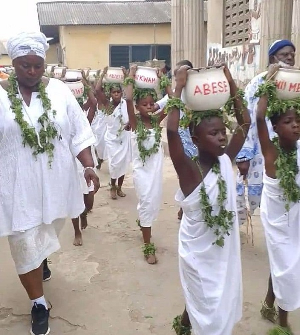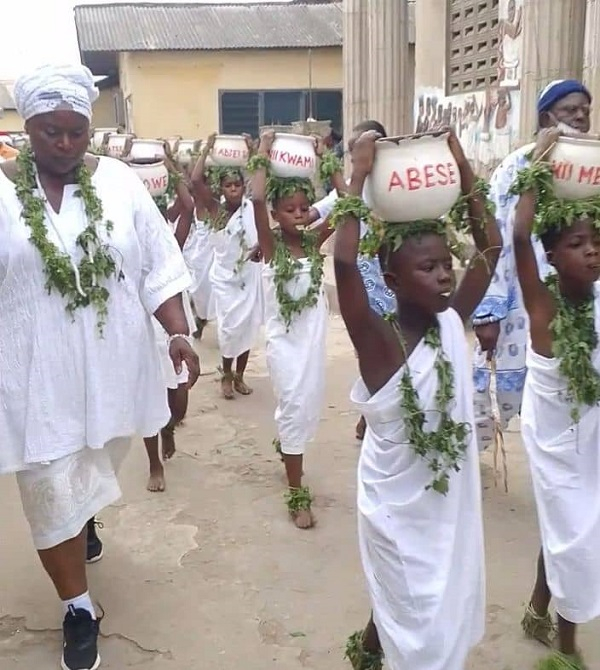 Young virgins both boys and girls believed to be pure, were selected for a sacred procession
Young virgins both boys and girls believed to be pure, were selected for a sacred procession
The Chief and people of the Abese La Adonten Division, on Sunday, July 13, performed the Sacred Water Fetching Rites, officially heralding the commencement of this year’s Afrimi Yele Yeli (Afrimi Yam Festival).
The event brought together residents of the La township, La villages, and well-wishers to the forecourt of the Abese La Adonten Palace, to witness and celebrate the beautiful and symbolic traditional and culturally rich rites carried out by the Abese people with solemn dignity and pride.
As part of the rituals, young virgins, both boys and girls, believed to be pure, were carefully selected for a sacred procession to the Jubilee Stream, a revered water source.
Accompanied by traditional drumming, appellations, folklores, and war songs, the procession moved in reverent silence and rhythmic intensity, embodying the spirit and resilience of the Abese people.
The children, dressed in white cloth and adorned with medicinal herbs tied around their necks, fetched the “holy water” three times, per custom and practice.
This sacred act symbolises spiritual purification, the renewal of ancestral blessings, and the readiness of the community to embark on the festivities in honour of the Afrimi Deity.
Upon their return to the palace, the chief and elders were formally briefed to confirm the safe completion of the journey. After verifying that there were no casualties, the elders offered solemn prayers of gratitude to God and the Ancestors for protecting the young participants and guiding the rites to success.
The Abese La Adonten Division, one of the principal clans in La, is widely known for its proud cultural identity and revered traditions, which continue to serve as a pillar of unity and belonging within the community.
The Afrimi Yele Yeli Festival marks the beginning of a sequence of sacred observances leading up to the La Homowo Festival. Deeply rooted in spirituality and culture, it aligns with the Ga traditional calendar and affirms the community’s dedication to preserving its ancestral heritage.
More than a ritual, the festival is a sacred time of reflection, thanksgiving, and ancestral invocation, a moment to seek divine favour and protection for the days ahead.
Despite the changing times, the sacred rites led with purpose and devotion by Nii Kwade Okropong I remain an enduring symbol of clan identity, continuity, and communal strength.
Sprinkling of Otor (Mashed Yam Mixed with Red Oil)
In the early hours of Tuesday morning, the Chief of Abese La Adonten Division, accompanied by elders and Asafo groups, went through various households and shrines across La township to sprinkle Otor as an offering to other deities and ancestral spirits.
Durbar of Chiefs
In the afternoon, Abese La Adonten Mantse, Nii Kwade Okropong I, together with his elders and representatives from other La clans, held a durbar at the forecourt of Kwakwranya We. During the gathering, the Chief addressed the public, particularly the youth on the importance of abstaining from drug use and substance abuse.
This message tied into the festival’s 2025 theme: “Empowering Ghanaian Youth: Breaking the Chains of Drug Abuse through Cultural Heritage and Community Support.”
Later, around 5:00 PM, the Chief, elders, and invited guests moved to welcome the return of the Afrimi War Deity to the La township. The homecoming was marked by the pouring of libations and other traditional rites to honour the deity and invoke its blessings.
These sacred rituals and observances serve as climactic preludes to the larger Homowo Festival, helping to renew spiritual blessings, pay homage to ancestors, and reinforce the cultural identity of the La people.


